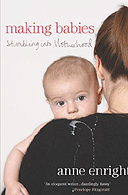
Making Babies: Stumbling into Motherhood
Anne Enright
Cape £10.99, pp196
The suggestion that birth and motherhood are almost as taboo as death in our society, would, as like as not, be met with guffaws of disbelief in mixed company. What about all those female columnists moaning and quipping their way across the newspaper pages about how difficult it is 'juggling' and how little sleep they get? Surely we hear more than enough about the hilarious antics of couples attending birth classes and the stresses of finding the right childcare.
I suspect novelist Anne Enright would argue that all this phoney intelligence of minor skirmishes brought back from the front line merely serves to distract our attention from the main theatre of war; a place where established identities are being ripped apart, bodies violently altered and relationships put under a potentially fatal strain. Enright's autobiographical book about the shocks and rewards of motherhood accepts as a basic premise that getting pregnant and going through labour is a scary, odd thing.
Of course, as Enright knows, a new mother is only doing what has been done by countless other women before her, but that doesn't make it any less strange when it happens to you. As generations of young men once used to face the prospect of fighting a war, young women still have to cope with the idea that they may well go through an extraordinary physical ordeal, even if the risk of childbearing is greatly reduced in the modern age.
Enright has excellent phrases for some of the states of mind and body involved. Pregnancy, she says, is a 'limbo state', 'a non place' in which you feel a lot like a clock that can't be hurried and runs to its own time.
But it is the author's traumatic memories of labour itself that will send a chill through any mother who picks up Making Babies. Her struggle with a never-ending blur of pain in unfamiliar surroundings is closer to most women's experience of childbirth than is usually acknowledged. 'It has been 45 minutes since I realised that I could not do this any more,' she writes of her wait for an epidural anaesthetic, 'that the pain I had been riding was about to ride over me, and I needed something to get back on top, or I would be destroyed by it, I would go under - in some spiritual and very real sense, I would die.'
Rather like Rachel Cusk's even more forthright and startling book on the subject, A Life's Work, Enright's writing has the humour and urgency of someone who is grasping rare moments of solitude to communicate with the outside world. Like Cusk, she wrote quickly while her baby slept or was minded by a helpful partner; like Cusk, she has also gone on to have another child, in spite of the unholy jolt to the psyche caused by the first.
Both novelists were struck by the incongruity of the advice women receive in the standard pregnancy texts, and the jaunty optimism of the tone. While Cusk suspected a social conspiracy designed to keep women producing, Enright too has a nose for peer-group propaganda. On hearing news of her pregnancy her friends suddenly seemed keen to point out just how important and vulnerable a baby is. It is a kind of herd instinct. One friend even goes so far as to hold up a pair of tiny baby shoes, explaining that these are also shown to child molesters as a way of making clear the innocence and fragility of their victims.
The pure pleasures of parenthood are in this book too, but Enright is frank about the real significance of introducing her child to new sensations: she admits it is more about heremotions than her daughter's. On standing her baby barefoot on a lawn, she writes: 'She loved this, but maybe not so much as I did - her first experience of grass. For her, this green stuff was just as different and delicious as everything else - the "first" was all mine. Sometimes, I feel as though I am introducing her to my own nostalgia for the world.'
Is it then just women of letters, and of a certain income, like Enright and Cusk, who have the luxury of such a complex reaction to motherhood? Possibly so, but there is no denying that although more women now give birth later in life, in a considered, responsible way, they still find themselves surprised by the event.
Perhaps, as confident, established women, they are all the more unsettled by the way having a baby throws you back into a second teenage. Once more, you find yourself trying to cope with shopping, crowded buses and fiddly small change, impeded this time not by your lack of worldliness, but by the presence of an unpredictable small person at your side.
Enright suggests another reason why women might be unexpectedly bewildered by the physical arrival of a child they had always assumed they would have one day. She believes many young women's preoccupation with finding sexual love blinds them to the fact they may not really love unconditionally until they love a child. 'They want a man more than they want children, or at least they want it first,' Enright argues.
In a kind of verdict on the life-shift she has undergone, Enright offers some catchy words of encouragement to new mothers. 'Life in here on the other side is just the same - only much better, and more difficult,' she says.

